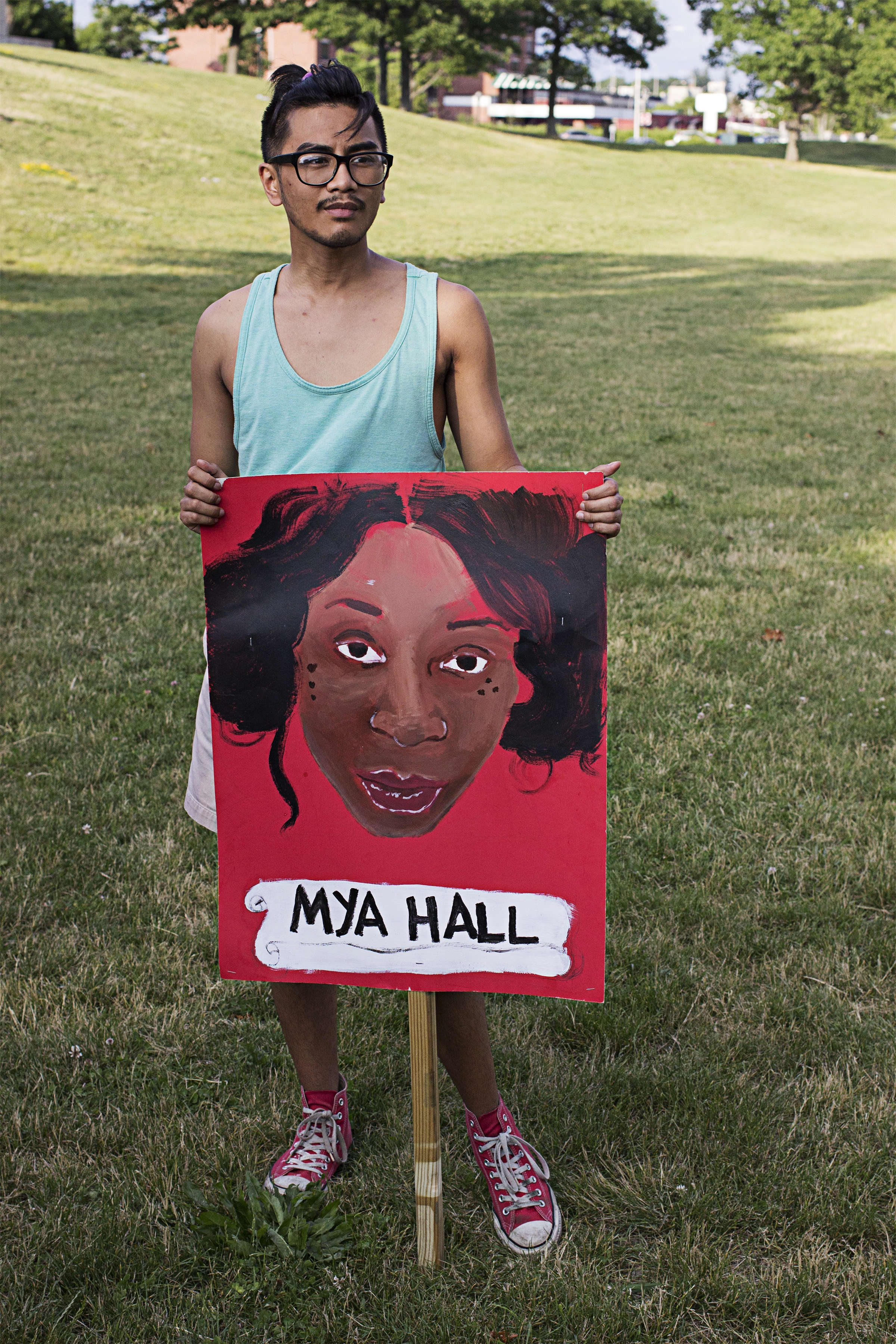Juneteenth: Rhode Islanders honor black cisgender and transgender women
This story was reported and produced by Kenneth Lusk and Tomas Navia. Photography by Kenneth Lusk. On Friday, June 19th over one hundred people gathered at India Point Park to commemorate the lives of cisgender and transgender black women who have been killed by police. Attendees...
This story was reported and produced by Kenneth Lusk and Tomas Navia. Photography by Kenneth Lusk.
On Friday, June 19th over one hundred people gathered at India Point Park to commemorate the lives of cisgender and transgender black women who have been killed by police. Attendees held signs with the painted faces and names of victims, while chanting their names.Organizers read poems and an open letter to the public.
 Here’s what some of the organizers had to say about their motivations for putting on the vigil, and the historical significance of June 19th:
“This is an event to honor black and cis and trans women whose lives have been affected by police state violence, and that’s not just people who have been killed,” said Andrea Sterling, one of the event’s organizers.
“That also includes the black cis and trans women who have been incarcerated, that includes the black cis and trans women who have affected by all sorts of violence. So that is who this event is for, to honor them.”
“Juneteenth, not so much in Rhode Island, but in some other states they still celebrate it to this day as the day where slavery ended. But through the past two years with all the uprisings that we’ve been having and all the killings that we’ve had we can really see that we still exist in the afterlife of slavery.”
“So the question of has slavery truly ended, in the sense of is it not affecting us anymore, is one of the things that we are thinking about.”
“Juneteenth is a black holiday, and on holidays you honor family, you honor your people. Slavery has not really ended, we are haunted by everyday it to this day.”
Here’s what some of the organizers had to say about their motivations for putting on the vigil, and the historical significance of June 19th:
“This is an event to honor black and cis and trans women whose lives have been affected by police state violence, and that’s not just people who have been killed,” said Andrea Sterling, one of the event’s organizers.
“That also includes the black cis and trans women who have been incarcerated, that includes the black cis and trans women who have affected by all sorts of violence. So that is who this event is for, to honor them.”
“Juneteenth, not so much in Rhode Island, but in some other states they still celebrate it to this day as the day where slavery ended. But through the past two years with all the uprisings that we’ve been having and all the killings that we’ve had we can really see that we still exist in the afterlife of slavery.”
“So the question of has slavery truly ended, in the sense of is it not affecting us anymore, is one of the things that we are thinking about.”
“Juneteenth is a black holiday, and on holidays you honor family, you honor your people. Slavery has not really ended, we are haunted by everyday it to this day.”
 “I was tired of seeing marches that were only centered around black men,” said Monae McNeil, another organizer of the event. “It seems like when we talk about black lives matter only meant black men matter, and especially black trans women that’s something that the community as a whole needs to work out in terms of figuring out how to support these people instead of harming them, and we need to focus on that because black women, and black girls are being killed by police and being incarcerated at the same or higher rates than black men, and that needs to be talked about.”
“I was tired of seeing marches that were only centered around black men,” said Monae McNeil, another organizer of the event. “It seems like when we talk about black lives matter only meant black men matter, and especially black trans women that’s something that the community as a whole needs to work out in terms of figuring out how to support these people instead of harming them, and we need to focus on that because black women, and black girls are being killed by police and being incarcerated at the same or higher rates than black men, and that needs to be talked about.”
 As the black lives matter movement has spread, the organizers say that national media has obscured the work and experiences of black women.
“I think the national media has played an interesting role in the black lives matter movement. I think that in general in American culture, it’s patriarchal, there’s sexism, there’s devaluation of women’s work, and the mainstream media is not an exception in the way that it treats women’s roles, especially in activist movements.”
As the black lives matter movement has spread, the organizers say that national media has obscured the work and experiences of black women.
“I think the national media has played an interesting role in the black lives matter movement. I think that in general in American culture, it’s patriarchal, there’s sexism, there’s devaluation of women’s work, and the mainstream media is not an exception in the way that it treats women’s roles, especially in activist movements.”
 The organizers also expressed that black transgender women are especially vulnerable, because they occupy a space of intersecting, marginalized identities.
“Black trans women are the most vulnerable to society because they have three things going against them. They are black, they are trans, and they are women. All of those oppressions that come with each group collide in one person,” said McNeil.
Moving forward the organizers hope to build a greater sense of community for activists in Providence, and to keep raising awareness about the issues that cisgender and transgender women face in the United States.
The organizers also expressed that black transgender women are especially vulnerable, because they occupy a space of intersecting, marginalized identities.
“Black trans women are the most vulnerable to society because they have three things going against them. They are black, they are trans, and they are women. All of those oppressions that come with each group collide in one person,” said McNeil.
Moving forward the organizers hope to build a greater sense of community for activists in Providence, and to keep raising awareness about the issues that cisgender and transgender women face in the United States.


